Lactose free protein powders are supplements that deliver the protein you need for fitness and health without any dairy byproducts.
Most popular protein products are made with whey or casein protein, and while these dairy-derived products are low in lactose, they aren’t completely lactose-free.
People with severe lactose intolerance, not to mention people with dairy allergies, won’t do well with a whey or casein-based protein powder.
This is where lactose free protein powder comes in. If you want all the benefits of highly concentrated, rapidly absorbed protein with none of the drawbacks of dairy, you’ll want to check out these lactose-free protein powders.
Research
Rankings
1. Performance Lab SPORT Protein
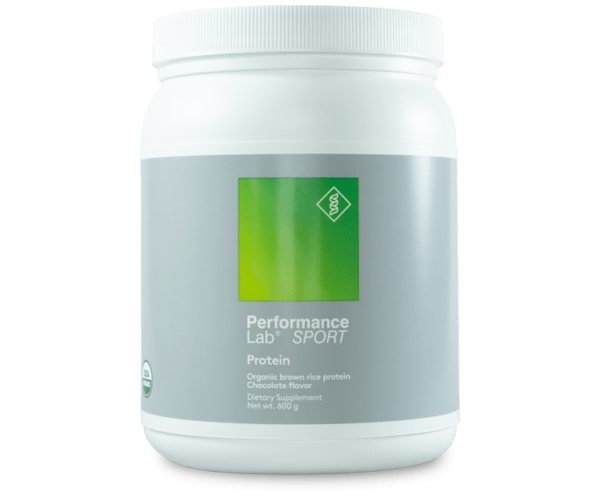
Click here for the lowest price
Performance Lab® prides itself on the purity of its products, and SPORT Protein is no different.
It’s 100% plant-based and vegan-friendly. It has no additives or animal content.
It’s made from USDA certified-organic brown rice protein, formulated for superior absorption, quality, and taste.
It’s naturally flavored with cocoa, vanilla, and cinnamon for a velvety chocolate finish. It’s perfect for smoothies and shakes.
BodyNutrition’s #1 lactose-free protein powder.
2. Ladder Plant Protein Powder
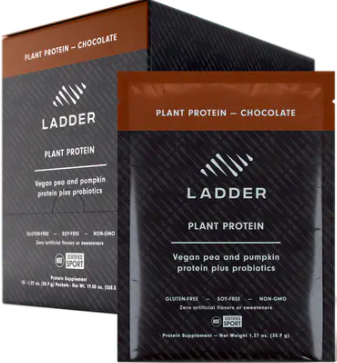
Ladder provides an NSF-certified plant protein powder that is is both pure and free of lactose. Unlike most other lactose-free protein powders, it contains a complete essential amino acid profile, ensuring your muscles get the nutrition they deserve.
Every serving provides over 2 billion CFU probiotics and 4.5g of BCAAs to support healthy digestion and optimal absorption. With no artificial sweeteners, fillers or ingredients, you can be sure that every serving is exactly what you’d expect from this top-tier brand.
3. Elevate Plant Based Performance Protein
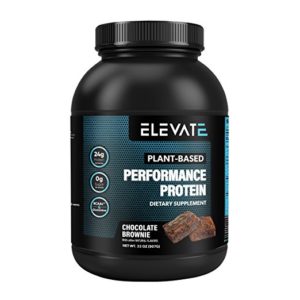
If you want a lactose-free protein powder that tastes great, has clean ingredients,and is easy to blend, look no further than Elevate.
Using a mixture of pea, hemp, and sweet potato protein, Elevate has a high protein content, a balanced amino acid profile, zero sugar, and is flavored only with cocoa powder, natural flavors, and monk fruit extract.
Himalayan rock salt adds some key electrolytes, making this a great protein powder for pre- or post-workout fueling.
4. Vega One Organic Plant Protein
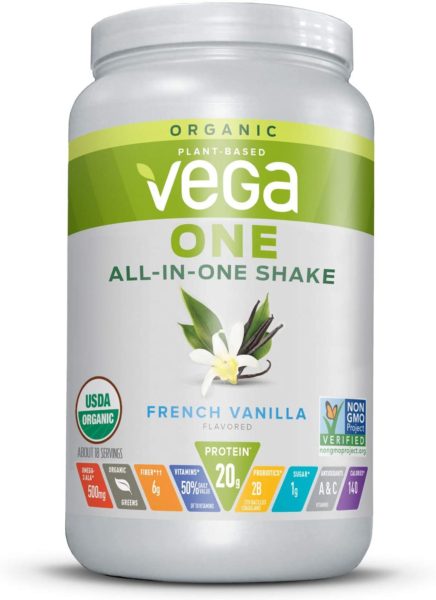
Vega One is a comprehensive plant-based protein and vitamin/mineral supplement. It uses pea protein (which is very well-balanced in terms of its amino acid profile) for most of its protein, while tossing in a blend of fruit and vegetable concentrates for strong antioxidant power.
It’s even got some probiotics to aid with digestion, though the label does not disclose exactly how many colony-forming units of the bacillus coagulans probiotic bacteria it contains.
Other than these superfood concentrates, there are no sweeteners or additives, natural or otherwise, making it a great choice if you’re looking for a lactose-free protein powder that’s got some superfoods as well.
5. Left Coast Performance Bone Broth Powder
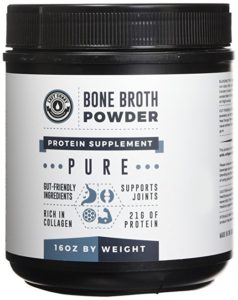
Bone Broth is all the rage among health enthusiasts, and Left Coast has found a way to isolate the protein contained in beef bone broth and concentrated it into a powderized form.
As a supplement, it’s quite healthy and has the distinctive savory taste of bone broth. The protein content is exceptionally high (over 90% by weight), and even with a small amount of cane sugar as a sweetener, there’s less than one gram of sugar per serving.
The only downside is that bone broth protein powder is not as easily mixed as other protein powders. It’s best-suited for blending into smoothies and shakes.
6. Ancient Nutrition Bone Broth Protein
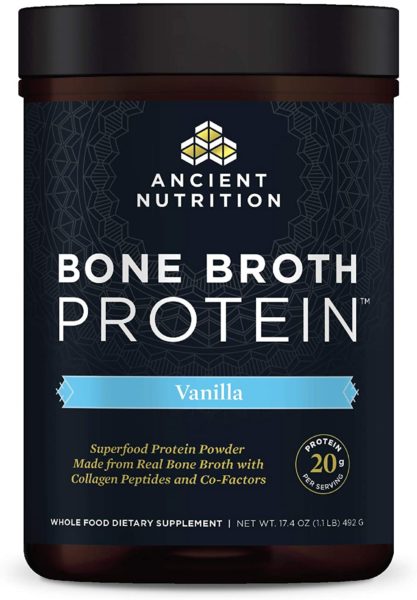
Ancient Nutrition Bone Broth Protein is a great source of lactose-free protein for people who are still looking for something with a full spectrum of amino acids. It uses stevia and natural vanilla extract for flavoring, and naturally sourced xanthan gum as an emulsifier. It mixes up easily, tastes great, and has great protein content, all without any lactose.
7. MRM Natural Egg White Protein
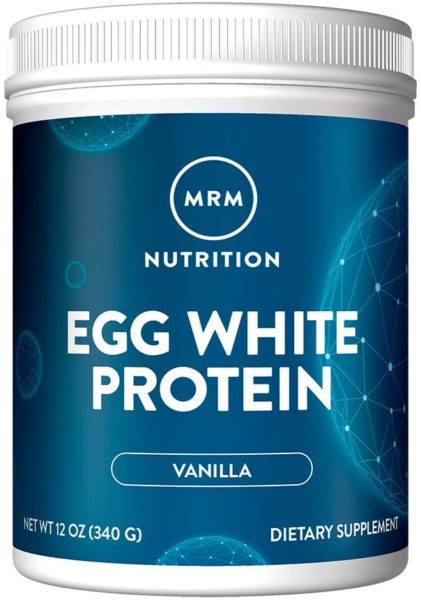
Egg whites are prized for their high protein content and low cholesterol content, and MRM makes one of the best egg-based protein powders.
It’s got a good balance between purity and usability: It’s flavored, but only with natural chocolate, stevia, and monk fruit extract.
8. Source Nutrition Egg White Protein
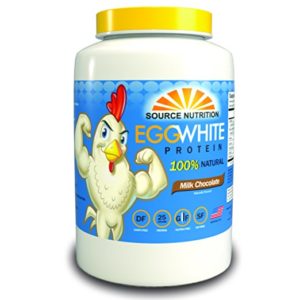
Source Nutrition has a very solid egg-based protein powder that blends up thick and creamy without any lactose or dairy ingredients.
It uses its “clean cream” blend of sunflower oil and tapioca to give this protein a frothy texture, and it’s sweetened with a combination of natural flavors, stevia, and the non-caloric herbal extract luo han guo. For fans of egg protein, it’s a good choice.
9. Aloha Organic Protein Powder
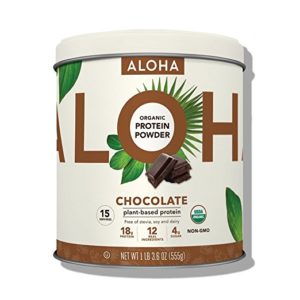
Aloha uses a blend of pea, hemp, and pumpkin seed for its protein content, as well as coconut water and coconut sugar for vitamins, minerals, and flavoring.
Unfortunately, though this coconut sugar is tasty, it ups the sugar content quite a bit; for every four grams of protein, there’s nearly one gram of sugar.
For highly active athletes, this is not a big issue, but if you are using protein powder as part of a low-carb diet or as part of a program to drop fat, the sugar content might be an issue for you.
10. PlantFusion Complete Plant Protein
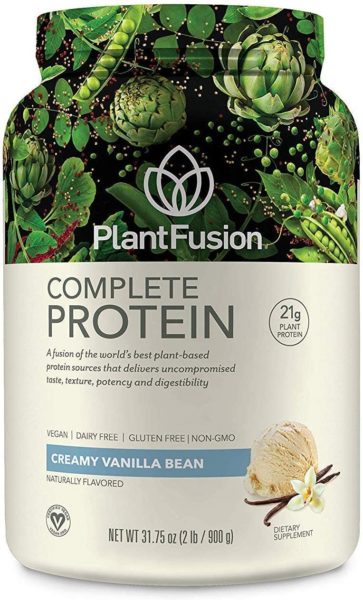
PlantFusion uses a mixture of pea protein, artichoke protein, amaranth powder, and a selection of amino acids to constitute its protein profile.
The protein makeup is solid, though low carb and low sugar enthusiasts will not like the choice of using fructose as an additive.
11. No Udder Protein
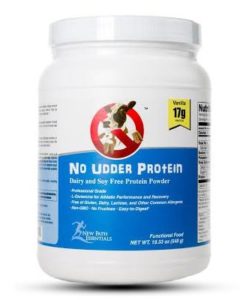
No Udder Protein promises a dairy free protein powder but ends up a little more complicated than necessary.
It uses a combination of pea protein, rice protein, and a couple of amino acids to create its protein profile, which is fine—the problem is that the blend has a lot of extra ingredients, like cane sugar, binders, emulsifiers, and sweeteners, that lower the protein content and dilute the product.
12. BlendItUp Protein + Smoothie Mix
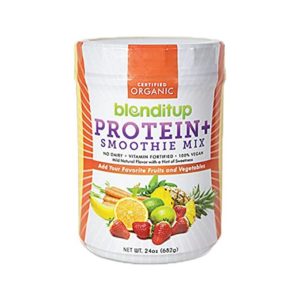
BlendItUp is a popular base mixture for smoothies, and while it does contain some protein, it’s not in nearly high enough a concentration to compete with other lactose-free protein powders.
It’s nice to see extras like the vitamin blend and chia seeds included in the ingredients, but given the lack of an actual protein concentrate or isolate, the level of protein (less than 50% by weight) leaves a lot to be desired.
Category winners
Best lactose-free protein powder overall: Performance Lab SPORT Protein
All-natural, plant-based, flavored with cocoa powder and yacon root, and providing bacillus coagulans…what else is there to want when it comes to a lactose-free protein powder? Whether you’re cutting down on animal-based protein or trying to add muscle mass, Performance Lab SPORT is an all-around winner.
Best lactose-free protein powder for women: Ladder Plant Protein Powder
Women who want to keep their protein intake high should opt for Ladder Plant Protein—thanks to its inclusion of branched chain amino acids and probiotics, it provides nutrients for all-around athletic performance and health. Plus, you get the choice of all-natural chocolate or vanilla flavor.
Best lactose-free protein powder for building muscle: Performance Lab SPORT Protein
If you’re serious about increasing your lean body mass, Performance Lab SPORT should be your protein of choice. Its rice-based protein is rapidly absorbed, helping to augment post-workout recovery. On top of that, the taste is smooth but not overpowering, meaning you’ll never get taste bud fatigue.
Best lactose-free protein powder for vegans: Vega One Organic Plant Protein
Vega One is our recommendation for vegans thanks to its inclusion of a wide range of natural sources of antioxidants, including kale power, pomegranate juice powder, and chia seeds, to name just a few. These will help shore up any micronutrient deficiencies in your diet, making it a great choice for vegans looking to keep their protein intake high.
Best lactose-free bone broth protein powder: Left Coast Performance Bone Broth Powder
Want your protein lactose-free but still with the full amino acid profile of animal-based protein? Left Coast is the choice for you. This bone broth protein is packed with the full range of amino acids and hardly anything in the way of carbs, making it perfect for serious athletes and paleo dieters.
Best lactose-free protein powder for smoothies: Performance Lab SPORT Protein
Performance Lab SPORT adds just the right amount of sweetness and smoothness to a protein shake or smoothie. On top of that, it doesn’t rely on artificial flavoring or added sugar to do it. For a plant-based meal replacement or post-workout smoothie, it’s our favorite pick.
Who should buy lactose-free protein powder?
Dairy-based proteins like whey protein and casein protein are king when it comes to popular sources of supplemental protein, but they definitely aren’t right for everyone.
If you only have a mild or moderate degree of lactose intolerance, you can probably get away with a dairy-based protein powder, but people with stronger degrees of lactose intolerance or a milk or dairy allergy should opt for something that is completely free of lactose.
Lactose-free protein powders serve three primary groups: vegans and vegetarians who want to avoid animal-based proteins, people who are lactose intolerant, and people who have milk or dairy allergies. Many, but not all, lactose-free protein powders are also vegan-friendly: plant based sources like pea protein, soy protein, and rice protein are all solid sources of protein without containing lactose.
However, some animal-based proteins, like bone broth protein, are lactose-free and have the added bonus of being complete sources of amino acids.
When it comes to lactose intolerance, even though most of the lactose in milk is removed during the processing steps that generate whey or casein protein, some lactose (around 1% by weight) remains.
People have different degrees of lactose intolerance, which means that some people who are lactose intolerant can take a milk-based protein powder without any issues. However, if you find yourself having gas, indigestion, bloating, or other gastrointestinal issues after taking your protein shake, you might want to try a totally lactose-free protein powder instead to see if it makes a difference—you might have a greater degree of lactose intolerance than you thought.
Finally, people with a milk allergy should definitely opt for a non-dairy protein powder: small amounts of milk allergens still remain in whey, casein, and milk protein powders, so you should avoid these to avoid allergic reactions.
Fortunately, there are plenty of great options out there if you are in the market for a lactose-free protein powder.
How we ranked
The primary goal for our rankings was to provide you with the best protein options on the market that do not have any ingredients derived from milk. That meant that any product that contained whey, casein, or milk proteins was out of consideration straightaway.
When it came to comparing animal-based versus plant-based proteins (for example, pea protein versus bone broth protein or egg white protein), we had to weigh the broader appeal of plant-based products against the slightly better distribution of amino acids in animal-based proteins.
Vegans, vegetarians, and omnivores can all opt for a plant-based protein, though no one single plant-based source of protein can provide the full spectrum of amino acids that you need.
This problem can be sidestepped a bit by using multiple different plant based sources of protein: we rated lactose-free protein supplements higher if they circumvented incomplete amino acid profiles by using this strategy.
As a result of this boost to the rankings, the very best plant-based sources of protein tended to edge out the egg or bone broth based products, but only by a small margin.
With any protein powder, there’s a tradeoff among taste, ease of use, and purity. Some people desire ultra-pure protein powders with just one ingredient: the source of protein they are looking for. These people tend to mix up their protein powder into shakes, smoothies, green drinks, or with a non-dairy milk like almond milk or oat milk.
While the purity in these products is a great virtue, they tend to be chalky, bland, and very challenging to mix into plain water. An alternative is to go for a flavored protein powder that uses natural flavors, sweeteners, and emulsifiers to make it easy to mix up in a protein shaker.
Unfortunately, this can add a lot of additional ingredients to a protein powder, not all of which are desirable. Lower quality protein powders use artificial sweeteners, coloring agents, and flavors.
Our research team favored lactose-free protein powders that used naturally-occurring non caloric sweeteners like stevia and monk fruit extract, and natural flavoring like real vanilla bean extract or cacao powder.
Lastly, we considered any additional perks, like fruit and vegetable extracts and electrolytes found in some lactose-free protein powders. These were nice to have, but didn’t make any big difference in the rankings.
Instead, purity, quality, and source of protein had the biggest influence. Our final rankings offer a great selection of options for high quality lactose-free protein powder, whether you want a plant-based or animal-based source of protein.
Benefits
People who are lactose-intolerant or allergic to dairy still need protein for maximum performance. Protein powder is essential if you want to gain muscle, lose weight, or recover faster after training sessions at the gym.
But most traditional protein powders are made from dairy products—whey protein is by far the most common protein powder you’ll find, followed closely by casein protein powder, which is also derived from cow’s milk.
While these protein powders are low in lactose, their lactose content is not always zero. Further, if you are not just lactose intolerant, but allergic to dairy, any diary-derived protein powder is a no-go.
Lactose-free protein powder won’t cause digestion issues. The first and most obvious benefit of a lactose-free protein powder is the lack of lactose.
Even the Whey Protein Institute admits that whey protein (as well as other dairy-derived proteins) are approximately 1% lactose by weight (1).
This can cause the classic symptoms of lactose intolerance: bloating, nausea, cramps, abdominal pain, and gas, according to the Mayo Clinic (2).
The amount of lactose that aggravates your digestive system varies depending on your degree of lactose intolerance; some people can get away with consuming whey or casein protein if their lactose intolerance is mild or moderate.
However, people with severe lactose intolerance usually are not able to consume milk-based proteins, especially in large amounts.
If you are lactose intolerant and you plan on taking a lot of protein as part of a training program, it’s best to opt for a protein powder that’s lactose-free.
Dairy-based protein can cause allergic reactions. Even hydrolyzed whey protein, which is supposed to be less allergenic than standard unprocessed whey protein, can cause allergic reactions in people with a milk or dairy allergy, as documented in a case report in the Journal of Pediatrics (3).
While people with mild to moderate lactose intolerance can typically handle moderate amounts of milk-based protein powder, people with milk allergies are a different story. Another medical study describes the case of a 24-year-old bodybuilder who developed gastrointestinal complaints over the course of a few months (4).
When the medical staff reviewed his diet, they discovered he was using large amounts of hydrolyzed whey protein as a part of his bodybuilding routine. While the patient did not have a history of milk allergy in the past, some testing revealed that he had developed a cow’s milk allergy.
Once the hydrolyzed whey protein was swapped out for a lactose-free protein powder, his symptoms went away.
If you’ve upped your protein intake recently and have encountered more digestive or gastrointestinal problems at the same time, it might be worth considering trying a lactose-free protein powder instead—you might have an adult-onset allergy, or a previously undetected lactose intolerance that is being triggered by greater intake of milk-based proteins.
Mixtures of plant-based proteins offer a complete amino acid profile. One often-cited benefit of whey and casein proteins is that these protein powders have a complete profile of all of the essential amino acids your body needs for recovery and muscle synthesis.
Non-dairy proteins that are still based on animal products, like bone broth protein or egg white protein, are also intrinsically well-balanced in their amino acid profile. But the amino acid balance in plant-based protein is really only a problem if you consume just one type of plant based protein throughout the day.
A scientific review article by Vernon Young and Peter Pellett at the Massachusetts Institute of Technology evaluated the ability of plant based proteins to fulfill the nutritional and dietary needs of humans (5).
According to Young and Pellett, the ideal plant based proteins come from a mixture of different plant sources. This could come from a combination of pea protein and soy protein, or hemp protein and pumpkin seed protein to pick just two examples.
Lactose-free protein can be as high or higher-quality than milk-derived protein. Young and Pellett also cite research refuting the idea that plant proteins are of intrinsically lower quality than animal proteins.
The quality of a protein, according to the two researchers, is dependent only on its concentration in the protein source, not where the source comes from.
So, a source like rice or pea protein, which is over 80% protein by weight, can be considered equally high-quality as whey protein, which is likewise very high in its protein content.
The same may not be true for protein blends that include non-protein ingredients which significantly dilute the protein content of the supplement.
Side effects
Since they are derived from non-dairy sources, lactose-free protein powders are exceptionally well-tolerated.
Protein powders in general are very safe, and given that a lactose-free protein powder is not going to have the allergenic risks of a milk-based protein powder, this is even more applicable to these supplements.
Given the tremendous quantities of protein that bodybuilders and weightlifters consume on a regular basis without issue, side effects related to lactose-free protein powders can be considered non existent.
Recommended dosage
Protein intake is going to depend on your fitness and health goals, as well as your body size. As you might guess, bigger people need more protein, in part because they have more muscles to grow and repair.
Because of this, protein needs are usually expressed as a function of your body mass in kilograms. According to a 2004 scientific article in the Journal of Sports Sciences by Kevin Tipton and Robert Wolfe at the University of Texas, strength/speed athletes and endurance athletes have different protein needs (6).
For athletes specializing in strength, speed, or power, a protein intake of 1.2 to 1.7 grams per kilogram of body mass per day has been the historically recommended intake level.
On the other hand, endurance athletes need slightly less: about 1.2 to 1.4 grams of protein per kilogram of body mass per day has been the usual recommendation.
However, Tipton and Wolfe present evidence suggesting that athletes looking to increase their body mass or their raw muscular size may need substantially greater protein intakes—possibly up to 2.5 or 3 grams of protein per kilogram of body mass per day.
Tipton and Wolfe say that there appears to be little downside to a high daily protein intake, so athletes looking to gain mass and muscle size should not worry about being on the high end of these recommendations.
FAQ
Q: Does whey protein have lactose in it?
A: Whey protein is derived from cow’s milk, which has substantial amounts of lactose in it. However, cow’s milk is processed and filtered to produce whey protein, which removes a lot of the lactose content—but not all of it.
According to the Whey Protein Institute, an industry group that disseminates information on whey protein, a typical whey protein concentrate powder is less than one percent lactose by weight (7).
How much lactose you can consume without having gastrointestinal problems is a function of the severity of your lactose intolerance. Many people who are lactose intolerant can nevertheless eat dairy products that are fairly low in lactose, like cheese, yogurt, and butter.
If these types of dairy don’t cause bloating, gas, or other gastrointestinal problems for you, dairy-based proteins like whey or casein will probably be fine as well.
However, if even low-lactose dairy products cause problems, you should definitely opt for a lactose-free protein powder.
Q: Can you use lactose-free protein powder for weight loss?
A: While whey protein does have some of the strongest evidence supporting its use as a protein for weight loss, you can nevertheless gain many of the same benefits with a lactose-free protein powder.
The benefits of whey protein tend to be slight advantages in terms of boosting your fat oxidation and increasing feelings of satiety. Many of these benefits are attributed to the greater range of amino acids in whey protein, so if it fits with your dietary preferences, opt for an animal-based protein powder like egg white protein or bone broth protein if you are looking to use your protein powder for weight loss.
These products will give you the full range of essential amino acids, including all three branched chain amino acids.
Even if you opt for a plant-based protein powder instead, the differences between whey and other proteins is fairly small, compared to the differences between a healthy routine for weight loss that incorporates protein powder and your old dietary habits.
Q: What kinds of protein are lactose-free?
A: Any kind of protein that is not derived from cow’s milk will be naturally lactose-free. This includes all plant-based proteins, like rice, soy, and pea protein, but also includes bone broth protein that comes from cows—because it’s not derived from cow’s milk, it’s still lactose-free.
If you are using a multi-ingredient protein powder, be sure to check all of the ingredients: often, commercially available protein bars, protein shakes and meal replacement shakes will use several sources of protein, some of which may be lactose-free and some of which may not.
For a protein product to be lactose-free, it can’t contain whey protein, casein protein, or milk protein in any form.
Q: How do I know if my protein powder is lactose-free?
A: Most protein powders that are lactose-free will explicitly advertise it on the front of the label, because it’s a competitive advantage for selling their product. Nevertheless, if yours does not, you can check the ingredients list.
If your protein powder’s ingredients list mentions any form of whey protein (whether it is whey protein concentrate, whey protein isolate, or hydrolyzed whey protein), casein protein, or milk protein, that means it is not lactose-free.
Other sources of protein, even animal sources like bone broth and eggs, are fine—these are not derived from cow’s milk, and as a result, do not have any lactose in them.
Q: Can lactose-free protein powder help you gain weight?
A: Yes, lactose-free protein powders have pretty much all of the same advantages when it comes to weight gain that dairy-based protein powders have.
The edge that whey protein (and particularly hydrolyzed whey protein) seems to have over other kinds of protein is more relevant to weight loss: whey seems to create slightly higher fat oxidation than other types of protein.
However, if you are looking to gain weight, the biggest single factor is your total macronutrient content that comes from protein (as well as your workouts, of course). A secondary factor is getting a complete amino acid profile, but with a variety of sources of protein in your diet, or a multi-ingredient or animal-based lactose-free protein powder like several of the products that you can find in our rankings, you’ll easily get the full spectrum of amino acids.
Many great athletes and bodybuilders have no issues putting on weight and muscle mass with lactose-free protein powder.
Q: Are lactose-free proteins also dairy-free?
A: Generally, yes, if a protein is labeled lactose-free, that means it is also dairy-free. Lactose occurs in dairy products, so any of the protein powder products that explicitly advertise themselves as lactose-free are not made from cow’s milk.
One place you should be careful is with products that talk about having a low lactose content, which encompasses most milk-derived proteins, including whey and casein. It is technically true to say that these are low lactose, but they are definitely not lactose-free or dairy-free. If you want a dairy-free protein powder, you should avoid milk, whey, and casein protein powders, and any product that uses them as ingredients.
As mentioned earlier, you should take particular care with multi-ingredient products like protein shakes, protein bars, and meal replacement shakes. That’s because these products often contain several different sources of protein.
Some of these protein sources may be lactose-free, while others may not. If you have a milk allergy or are severely lactose intolerant, make sure you check closely to make sure that all of the protein ingredients (as well as any flavoring agents) are not derived from dairy.
Q: What type of protein is best if you are lactose intolerant?
A: If you have no other dietary restrictions, there’s a strong case to be made that bone broth protein or egg white protein are the best single sources of protein that have no lactose in them.
That’s because both are animal-based proteins, and therefore have a full spectrum of amino acids. Egg white protein and particularly bone broth protein are extraordinarily low in carbs and fat, making them well-suited for the paleo and keto diets.
Plant-based proteins are great too, especially if you combine more than one type of protein to cover all of your bases when it comes to amino acids.
Related articles
- Paleo protein powder
- Bone broth protein powder
- Egg white protein powder
- Vegan protein powder
- Protein for women
- Protein for weight loss
- Hydrolyzed whey protein
Recap
If you want the benefits of protein powder but can’t tolerate dairy-based protein powders, fear not: you can get great results with a lactose-free protein powder.
If you are going with a totally plant-based protein powder, get one that’s got a blend of at least two different protein sources if possible—or use two different protein powders.
Another way to ensure you’ve got a good balance of amino acids is to use an animal-derived source of protein, such as egg whites or bone broth as your protein source.
If you want to ensure that your lactose-free protein powder is just as high-quality as a whey or casein protein source, check to make sure the actual protein content is high.
All of the best-quality lactose-free protein powders will have a protein content that’s far north of 60% by weight. Follow these guidelines and you’ll on track to get the health and fitness results you desire.
For BodyNutrition‘s #1 lactose-free protein powder recommendation, click here.